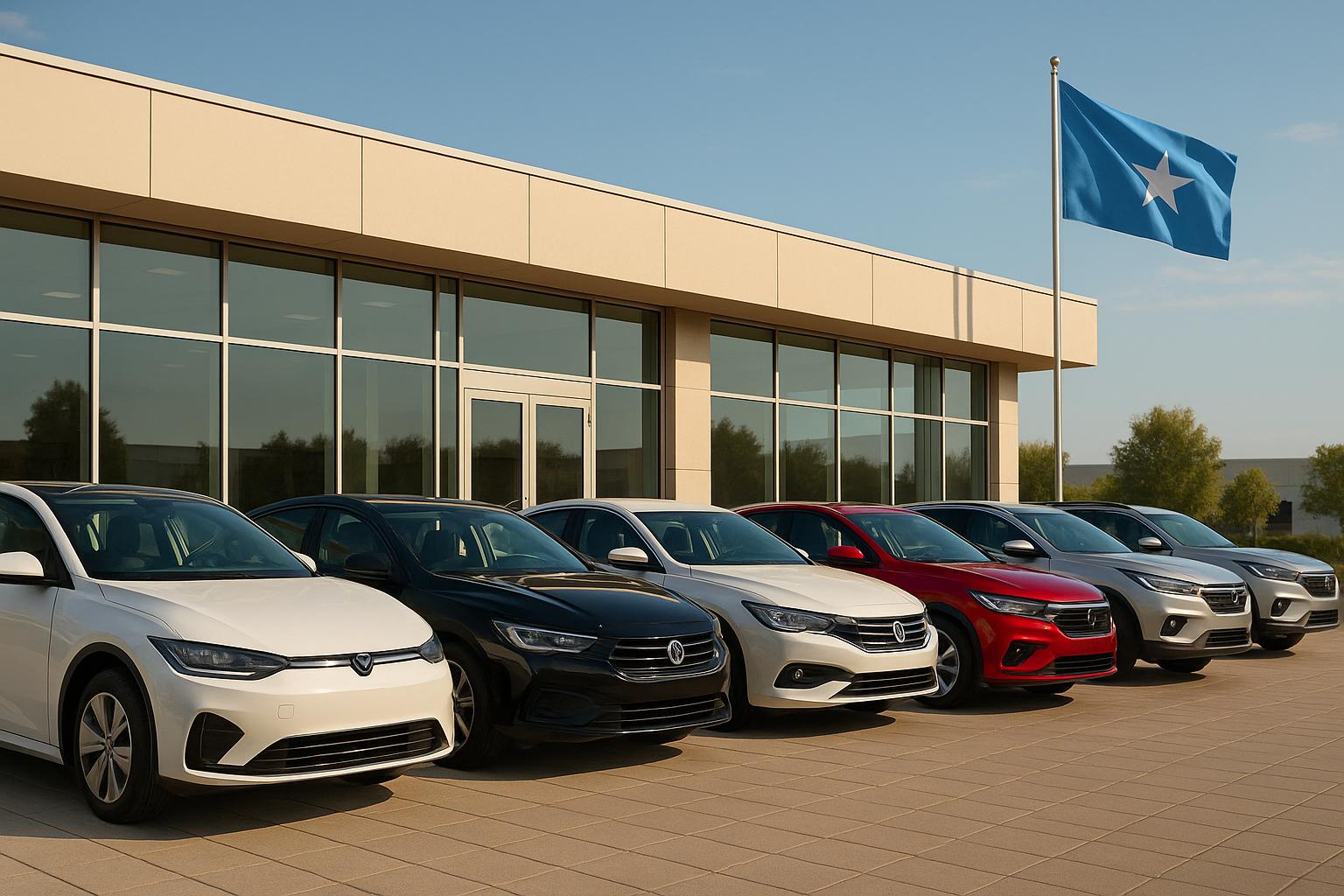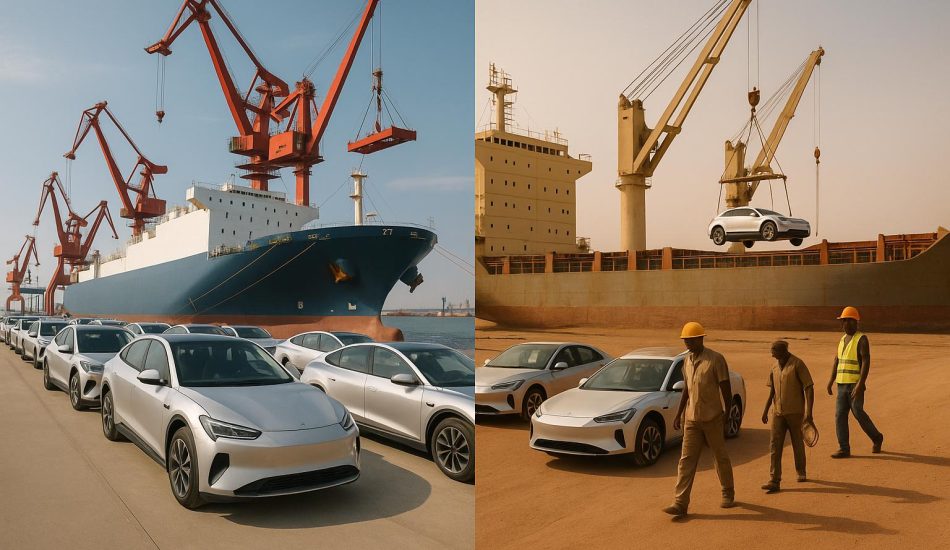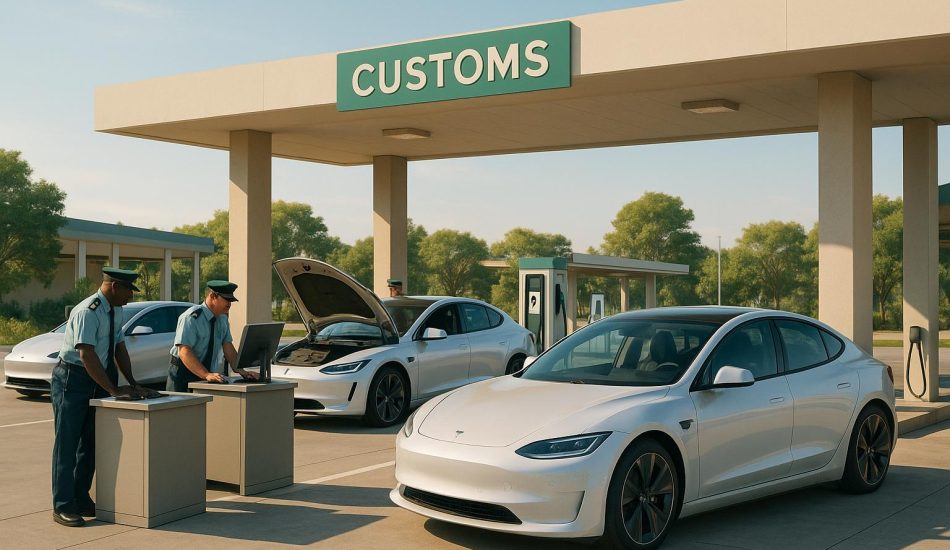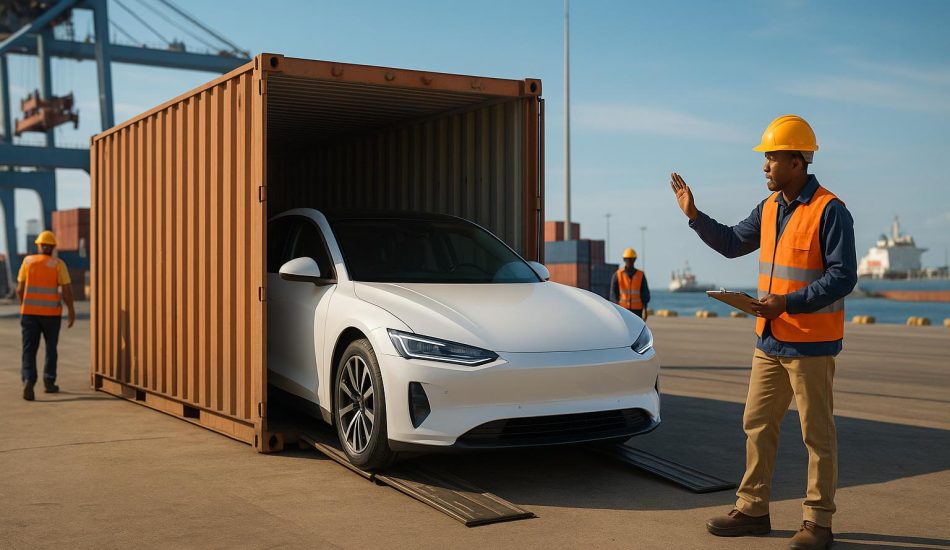
Somalia updated its car import rules in 2025, introducing separate guidelines for electric vehicles (EVs) and gasoline cars. Here’s what you need to know:
- EVs: Simpler import process and lower taxes, but no special tax breaks. Limited charging infrastructure may require private setups.
- Gasoline Cars: Must meet stricter emissions and safety standards. Import costs depend on engine size and vehicle condition.
- Key Documents: Logbook, Importation Certificate, Roadworthiness Certificate, Service History, and Tax Clearance are mandatory for all vehicles.
- Customs Clearance: Managed via the Somali Customs Automated System (SOMCAS). Accurate paperwork is critical to avoid penalties or delays.
- Penalties: Missing a Certificate of Conformity (COC) results in fines starting January 2025.
Whether you’re importing EVs or gasoline cars, proper planning and compliance are essential to avoid unnecessary costs and delays.
Somalia’s 2025 Car Import Rules Overview
Starting in 2025, Somalia will introduce updated procedures for importing gasoline and electric vehicles. These changes aim to refine the country’s automotive policies while addressing environmental concerns and regulatory compliance. However, with limited enforcement capacity, the application of these rules may vary across different regions. Here’s a closer look at how these adjustments will impact vehicle imports.
Updated Standards for Gasoline Cars
Gasoline vehicles will need to meet new standards focusing on emissions and safety. However, the precise thresholds and testing protocols for compliance have yet to be outlined.
Electric Vehicle Import Guidelines
Electric vehicles will be subject to a separate set of import procedures, distinct from those for gasoline cars. As with gasoline vehicles, the exact requirements for electric vehicle imports have not been specified.
Required Documents and Import Process
Importing vehicles into Somalia involves specific paperwork and following customs procedures through the Somali Customs Automated System (SOMCAS). Proper documentation is key to ensuring a smooth and efficient process.
Required Import Documents
As outlined in official guidelines, vehicle importers need to prepare the following documents:
- Logbook: This document provides proof of ownership, showing the vehicle’s registration details and ownership history.
- Importation Certificate: Confirms that the vehicle has been legally brought into Somalia through approved channels.
- Roadworthiness Certificate: Ensures the vehicle meets safety standards required for operation.
- Service History: Offers a record of the vehicle’s maintenance and overall condition.
- Vehicle Tax Clearance: Verifies that all required taxes have been paid, helping to avoid delays or penalties.
Having these documents ready is essential before moving on to the port clearance stage.
Port Clearance and Entry Points
Vehicle imports are managed through SOMCAS. In October 2024, the Ministry of Finance issued detailed guidance, including the "Standard Operating Procedures on Process of Customs Declarations Through SOMCAS" and the "Business Process Guide for the Clearance of Goods Through the Somali Customs Automated System". These documents outline the steps for customs declaration and clearance.
During the clearance process, customs officials review both the documentation and the vehicle itself. Importers should ensure all paperwork is accurate and complete. Customs duties and taxes are calculated based on factors like the vehicle’s specifications, age, and condition, with SOMCAS facilitating the assessment. Many importers rely on experienced customs brokers to minimize errors and streamline the process.
Import Costs and Tax Incentives
Planning your budget for vehicle imports in Somalia? Here’s what you need to know about the country’s 2025 vehicle import rules.
Tax and Duty Rates
Somalia applies a 25% duty on new diesel passenger vehicles with engine capacities ranging from 1,500 cc to 2,500 cc, classified under HS Code 87033210. This rate serves as a baseline for calculating taxes on various vehicle types.
Electric Vehicle Tax Treatment
Electric vehicles (EVs) don’t get any special tax breaks in Somalia. The same duty rates apply to EVs as they do to gasoline-powered cars.
Non-Compliance Penalties
Starting January 1, 2025, failing to include a valid Certificate of Conformity (COC) under the Somalia CBCA program will result in hefty fines. These penalties emphasize the importance of following Somalia’s import regulations to the letter. Cutting corners could lead to significant financial setbacks.
sbb-itb-99e19e3
EV Import Guide and Market Benefits
Thinking about importing an electric vehicle (EV)? The updated 2025 regulations apply to both EVs and gasoline-powered cars, but there are some key distinctions that can influence costs, maintenance, and infrastructure needs.
EV vs. Gasoline Car Comparison
Beyond the regulatory details, it’s worth examining the practical differences between EVs and traditional gasoline cars, especially when factoring in the tax advantages that often come with EVs.
One major benefit of EVs is their typically lower fueling costs, though how much you save will depend on local electricity rates and your driving habits. EVs also tend to require less routine maintenance since their design eliminates many of the moving parts found in conventional engines. Over time, this could mean fewer trips to the mechanic and lower service bills.
However, Somalia’s EV charging infrastructure is still a work in progress. Many new EV owners may need to invest in home charging setups to keep their vehicles powered. On the other hand, gasoline cars enjoy the convenience of an established network of fuel stations, which can be a significant advantage in some areas.
Vehicle Import Process Steps
Once you’ve weighed the pros and cons of EVs versus gasoline cars, here’s how to navigate the import process smoothly:
- Choose Your Vehicle: Platforms like EV24.africa provide detailed specifications, transparent pricing, and delivery options across Somalia, making it easier to find the right vehicle for your needs.
- Prepare Required Documents: Make sure you have all the necessary paperwork for importing your vehicle. Refer to the checklist mentioned earlier and confirm you’re following the latest guidelines.
- Coordinate Shipping: Work with your supplier to ensure the port is ready to receive your vehicle. Proper planning will help avoid delays during this stage.
- Customs Clearance: Handle customs duties and paperwork with care. Hiring a local customs broker can simplify this process and ensure everything is in order.
- Register Your Vehicle: After clearing customs, complete the registration process by obtaining license plates and meeting Somalia’s motor vehicle registration requirements. Both EVs and gasoline cars follow similar procedures here.
- Post-Import Logistics: EV owners should explore charging options and locate qualified service providers for ongoing maintenance. Gasoline car owners, meanwhile, should verify the availability of spare parts and reliable service centers for their specific models.
Conclusion
Somalia’s 2025 regulations bring a fresh approach to vehicle imports, introducing tailored procedures for electric vehicles (EVs) and gasoline-powered cars.
By focusing on proper documentation and navigating the SOMCAS system effectively, importers can avoid penalties and ensure a smoother clearance process. These updated steps aim to make the entire import experience more efficient and hassle-free.
Careful planning and strict compliance with these guidelines not only simplify the import process but also contribute to a more organized and effective automotive industry in Somalia.
FAQs
What emission and safety standards will gasoline cars need to meet under Somalia’s 2025 import rules?
As of now, the emission and safety standards for gasoline vehicles under Somalia’s 2025 import regulations remain unclear. However, there’s a general expectation that these standards will aim to align with international practices, encouraging the use of cleaner and safer vehicles.
To stay informed, it’s best to monitor updates from Somalia’s government or official automotive regulatory authorities as the 2025 implementation date gets closer.
What can EV owners in Somalia do to overcome the challenge of limited charging infrastructure when importing electric vehicles?
While Somalia’s electric vehicle (EV) charging infrastructure is still in its early stages, there are practical ways to work around this challenge. One effective solution is portable charging devices. Many EV owners opt for portable chargers that can be plugged into standard power outlets at home or other convenient locations. Another promising option is solar-powered charging systems, which are particularly well-suited for regions like Somalia with abundant sunlight. These systems provide an affordable and renewable way to keep EVs charged.
Looking ahead, exploring local initiatives or partnerships aimed at building EV infrastructure could make a big difference. Staying updated on government programs or private sector investments in charging networks can also help you make informed decisions about your EV usage. By combining these approaches, EV owners can overcome current limitations and contribute to the growth of electric mobility in Somalia.
What should I do if there’s a delay or issue with customs clearance through the Somali Customs Automated System (SOMCAS)?
If you’re facing delays or challenges with customs clearance through SOMCAS, the first step is to reach out to the Somali Customs Authority or your designated customs broker. They can help pinpoint the source of the delay. Double-check that all necessary documents – like invoices, import permits, and vehicle registration details – are fully completed and accurate. Missing or incorrect paperwork is often the root of such issues.
Should the problem continue, consider escalating the situation. You might need to visit the customs office directly or consult with a legal or trade expert who understands Somali import regulations. Taking a proactive approach and keeping open lines of communication with everyone involved can often speed up the resolution process.




